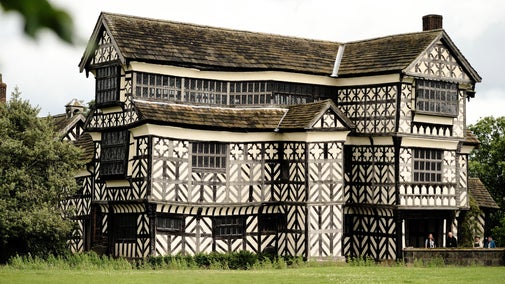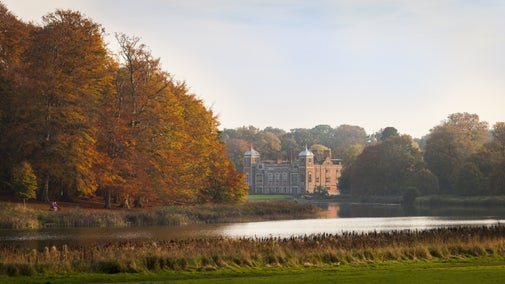
Donate
Everyone needs nature, now more than ever. Donate today and you could help people and nature to thrive at the places we care for.

Our chimneys have been waiting patiently for their turn to have some much needed repairs, and now at last the work is going ahead.
The towering features that are often the subject of wonder, and how like the house, they have managed to stay upright, are the staggeringly tall chimneys that reside at the hall. Much like any domestic chimney, there comes a time when they need some attention, to ensure they are safe and structurally sound and can continue to work in harmony with the rest of the building.
Over the past few years, our team have been monitoring the chimneys, and after two rather wet and windy winters, two of the chimneys began to show signs of wear and tear. In order to make the repairs, our team needed to act quickly and enlisted the help of Cheshire East Council for planning, Cheshire Wildlife Trust for ecology, structural engineers and surveyors for the repairs, alongside the internal experts at the National Trust – Building Surveyors, Curators, Conservators, and the entire Little Moreton Hall property team.
The ongoing project to restore the chimneys involves; masonry repairs, repointing and alterations to capping of the chimney stacks. The work will begin on Monday 8th of July for 12 weeks and will be carried out by an expert conservation team who specialise in heritage chimneys and roofs. The team have the necessary skills and knowledge to carry out the work whilst being sensitive to the historic craftmanship and the site as a whole.
The main challenges the team face are working at heights and the weather. The safest and most effective way of carrying out the work successfully is by using scaffolding to reach the dizzying heights of the chimneys. Our visitors will see various structures of scaffolding around the hall for the next 12 weeks, whilst the team work hard to complete the work as quickly as they can. The scaffolding will be wrapped with metal sheeting to provide protection for staff, volunteers and visitors but also as a security measure at night. During this time the safety of all our staff, volunteers and visitors is paramount, and the National Trust team and contractors have taken every measure to ensure this.
Working at such heights, the most favourable weather is over the summer, when the days are longer, hopefully drier and reduced wind speeds. We know the weather can be unpredictable in the UK but the work must take place now before we run the risk of facing the challenges of frost, shorter days, heavier rain and stronger winds. The summer is also a better time for the conservation team to work with lime mortar that will be used to secure the brick work, and needs fine weather to dry. This is also a more historically sympathetic material to use, to help the longevity of the chimneys.
Protecting nature and history are at the heart of everything we do, so we've also taken careful measures to ensure that any bats and birds in and around the hall are looked after during the work. We have worked closely with Cheshire Wildlife Trust who have carried out rigorous monitoring of the site and have briefed all teams involved on how to safeguard the wildlife and ensure no disruption to their habitats and daily life.
Every time you visit Little Moreton Hall, spend money in the tea room and pre-loved bookshop or become a National Trust member, it contributes towards this important work. Donations, big or small, are also welcome. With your help, the chimney's future can be protected - thank you.


Everyone needs nature, now more than ever. Donate today and you could help people and nature to thrive at the places we care for.
The cosy tea-rooms at Little Moreton Hall offer delicious meals and treats all year round and are open Wednesday – Sunday from 10.30am. During the school holidays the tea-rooms are open seven days a week, giving you more chances to pop in and have a brew.

Little Moreton Hall welcomes assistance dogs only throughout the hall, garden and tea-rooms. Access to other dogs is very limited. All other dogs are very welcome on leads on the front lawn, car park areas and the open area outside the moat.

While modern life rushes by outside, Little Moreton Hall, encircled by a moat, survives as a Tudor fantasy, transporting you back to another time.

Discover the ritual protection marks scattered about the house, how the Tudors used to sleep twice a night, and why Little Moreton Hall may be the wonkiest house you’ll ever see.

We believe that nature, beauty and history are for everyone. That’s why we’re supporting wildlife, protecting historic sites and more. Find out about our work.

Read about our strategy, which focuses on restoring nature, ending unequal access and inspiring more people.
